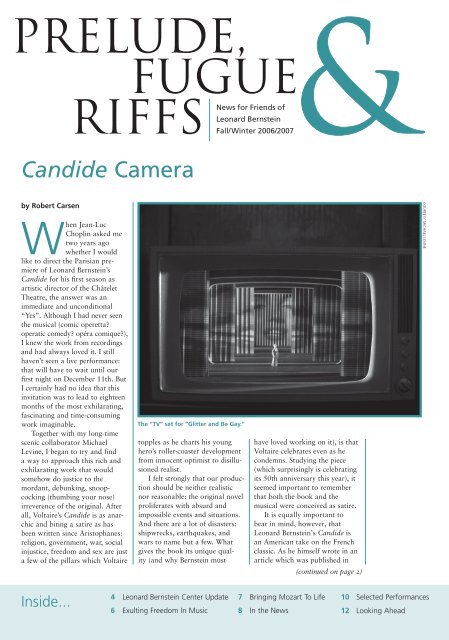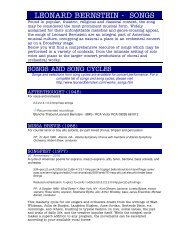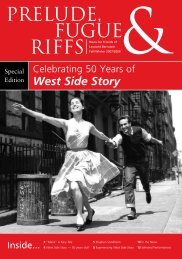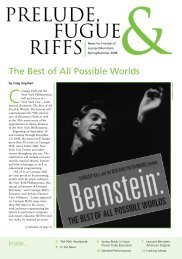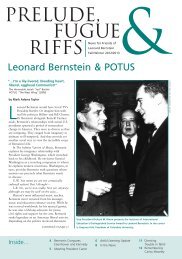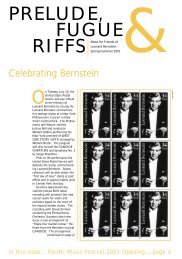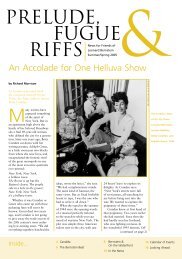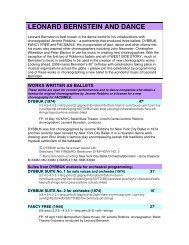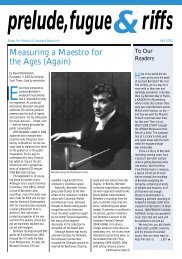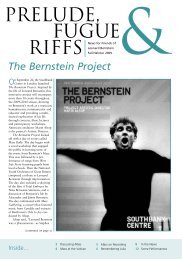Candide Camera - Leonard Bernstein
Candide Camera - Leonard Bernstein
Candide Camera - Leonard Bernstein
Create successful ePaper yourself
Turn your PDF publications into a flip-book with our unique Google optimized e-Paper software.
<strong>Candide</strong> <strong>Camera</strong><br />
by Robert Carsen<br />
When Jean-Luc<br />
Choplin asked me<br />
two years ago<br />
whether I would<br />
like to direct the Parisian premiere<br />
of <strong>Leonard</strong> <strong>Bernstein</strong>’s<br />
<strong>Candide</strong> for his first season as<br />
artistic director of the Châtelet<br />
Theatre, the answer was an<br />
immediate and unconditional<br />
“Yes”. Although I had never seen<br />
the musical (comic operetta?<br />
operatic comedy? opéra comique?),<br />
I knew the work from recordings<br />
and had always loved it. I still<br />
haven’t seen a live performance:<br />
that will have to wait until our<br />
first night on December 11th. But<br />
I certainly had no idea that this<br />
invitation was to lead to eighteen<br />
months of the most exhilarating,<br />
fascinating and time-consuming<br />
work imaginable.<br />
Together with my long-time<br />
scenic collaborator Michael<br />
Levine, I began to try and find<br />
a way to approach this rich and<br />
exhilarating work that would<br />
somehow do justice to the<br />
mordant, debunking, snoopcocking<br />
(thumbing your nose)<br />
irreverence of the original. After<br />
all, Voltaire’s <strong>Candide</strong> is as anarchic<br />
and biting a satire as has<br />
been written since Aristophanes:<br />
religion, government, war, social<br />
injustice, freedom and sex are just<br />
a few of the pillars which Voltaire<br />
inside...<br />
The “TV” set for “Glitter and Be Gay.”<br />
topples as he charts his young<br />
hero’s roller-coaster development<br />
from innocent optimist to disillusioned<br />
realist.<br />
I felt strongly that our production<br />
should be neither realistic<br />
nor reasonable: the original novel<br />
proliferates with absurd and<br />
impossible events and situations.<br />
And there are a lot of disasters:<br />
shipwrecks, earthquakes, and<br />
wars to name but a few. What<br />
gives the book its unique quality<br />
(and why <strong>Bernstein</strong> must<br />
4 leonard <strong>Bernstein</strong> Center update<br />
6 exulting Freedom in Music<br />
News for Friends of<br />
<strong>Leonard</strong> <strong>Bernstein</strong><br />
Fall/Winter 2006/2007<br />
have loved working on it), is that<br />
Voltaire celebrates even as he<br />
condemns. Studying the piece<br />
(which surprisingly is celebrating<br />
its 50th anniversary this year), it<br />
seemed important to remember<br />
that both the book and the<br />
musical were conceived as satire.<br />
It is equally important to<br />
bear in mind, however, that<br />
<strong>Leonard</strong> <strong>Bernstein</strong>’s <strong>Candide</strong> is<br />
an American take on the French<br />
classic. As he himself wrote in an<br />
article which was published in<br />
7 Bringing Mozart To life<br />
8 in the news<br />
(continued on page 2)<br />
CourTesy MiChael levine<br />
10 selected Performances<br />
12 looking ahead
Prelude, Fugue & Riffs Fall/Winter 2006/2007<br />
2<br />
as we observe the 16th anniversary<br />
of <strong>Bernstein</strong>’s death this<br />
autumn, we can only marvel at the<br />
astonishing array of releases, performances<br />
and activities revolving<br />
around the life and work of<br />
<strong>Leonard</strong> <strong>Bernstein</strong>. An exciting new<br />
production of <strong>Candide</strong> is taking<br />
shape at the Châtelet for its<br />
Parisian permiere, while new<br />
DVD’s and recordings continue<br />
to make news.<br />
And when <strong>Bernstein</strong> appears<br />
twice in the top twenty-five movie<br />
musicals of all time, we know his<br />
music isn’t going to be forgotten<br />
any time soon.<br />
We especially wish <strong>Bernstein</strong><br />
were here to see how his educational<br />
legacy is thriving at Gettysburg<br />
College, where the <strong>Leonard</strong><br />
<strong>Bernstein</strong> Center is revolutionizing<br />
teaching practices in this country.<br />
Except for the frustrating detail<br />
of his corporeal absence, there is<br />
the sense that <strong>Bernstein</strong> is still very<br />
much among us, gracing our lives<br />
with his wisdom, his passion and<br />
his music.<br />
J.B. ■<br />
<strong>Candide</strong> <strong>Camera</strong>, continued<br />
the New York Times just a few<br />
weeks prior to the Broadway<br />
premiere in 1956 (“<strong>Candide</strong> or<br />
Omnibus,” in which he interviewed<br />
himself under the guise<br />
of his own Irrepressible Demon):<br />
“Voltaire’s satire is international.<br />
It throws light on all the dark<br />
places, whether European or<br />
American. Of course, it’s not an<br />
American book, but the matters<br />
with which it is concerned<br />
are as valid for us as any — and<br />
sometimes I think they are especially<br />
valid for us in America.<br />
Puritanical snobbery, phony<br />
moralism, inquisitorial attacks on<br />
the individual, brave-new-world<br />
optimism, essential superiority<br />
— aren’t these all charges leveled<br />
against American society by<br />
our best thinkers? And they are<br />
also the charges made by Voltaire<br />
against his own society.”<br />
Religion, government,<br />
war, social injustice,<br />
freedom and sex are<br />
just a few of the pillars<br />
which Voltaire topples<br />
as he charts his young<br />
hero’s roller-coaster<br />
development from<br />
innocent optimist to<br />
disillusioned realist.<br />
In the same article, <strong>Bernstein</strong><br />
goes on to make the point that<br />
the musical will be American<br />
because his collaborators are<br />
all American and will therefore<br />
each bring his or her quality of<br />
American style, wit and humor to<br />
the work. <strong>Bernstein</strong> collaborated<br />
first with Lillian Hellman and<br />
then Richard Wilbur, Dorothy<br />
Parker, John Latouche, Stephen<br />
Sondheim and Hugh Wheeler<br />
— all of them American (except<br />
Wheeler) — as he revised the<br />
musical’s book and lyrics. We<br />
know that the dubious activities<br />
of Senator Joseph McCarthy<br />
and the House Committee on<br />
Un-American Activities were<br />
significant in motivating Lillian<br />
Hellman to suggest <strong>Candide</strong> to<br />
<strong>Bernstein</strong> as a topical subject for<br />
a musical stage piece in 1953.<br />
When she had appeared before<br />
the Commission the previous<br />
year, she was asked to name<br />
names of acquaintances with<br />
Communist affiliations. Instead,<br />
she famously delivered a prepared<br />
statement, part of which read:<br />
“To hurt innocent people whom<br />
I knew many years ago in order<br />
to save myself is, to me, inhuman<br />
and indecent and dishonorable.<br />
I cannot and will not cut my conscience<br />
to fit this year’s fashions,<br />
even though I long ago came to<br />
the conclusion that I was not a<br />
political person and could have<br />
no comfortable place in any<br />
political group.”<br />
A lot has happened since<br />
those Communist witch-hunts to<br />
make the world further consider<br />
America’s loss of innocence. It<br />
occurred to me that in our new<br />
production, we could parallel<br />
<strong>Candide</strong>’s loss of optimism<br />
with the loss of optimism that<br />
much of the world now feels for<br />
America as a whole. After all,<br />
what Pangloss pretends to believe<br />
in is a kind of philosophical and<br />
political spin “avant-la-lettre,”<br />
(after the fact) all too reminiscent<br />
of what we have been hearing<br />
recently from Washington. And<br />
so as I began to imagine the work<br />
in the light of an American satire,<br />
I found myself rearranging the<br />
order of some of the songs and,<br />
with the help of my long-term<br />
dramaturge Ian Burton, rewriting<br />
and restructuring the book.<br />
It says something of the need<br />
to keep the satire fresh that there<br />
has hardly been a new production<br />
of <strong>Candide</strong> which hasn’t<br />
altered the work’s content or
structure to some degree. In that<br />
respect we are following in the<br />
footsteps of what has become an<br />
unusual tradition. Nevertheless,<br />
it was surprising even for us to<br />
discover how easily the events of<br />
the musical allowed themselves<br />
to be transposed to a twentieth<br />
century American setting. I’m not<br />
just referring to the Act 2 scenes<br />
set in the “New World”: there<br />
are striking parallels to be found<br />
for the most imposing house in<br />
Westphalia, the war, the shipwrecks,<br />
the earthquakes and the<br />
auto-da-fé, to name but a few. In<br />
our version, Voltaire’s important<br />
narrative role is perhaps even<br />
larger than it has been hitherto.<br />
This is surely appropriate for the<br />
work’s Parisian premiere, where<br />
his voice will be heard in French<br />
(much of it taken directly from<br />
the original novel).<br />
Given the rapidity with which<br />
the action and locales change (as<br />
well as the aforementioned cycle<br />
of natural and man-made disasters),<br />
it seemed that television<br />
could be a useful and amusing<br />
scenic device with which to frame<br />
the action. It would give us the<br />
appropriate post-modern distance<br />
from which Voltaire could<br />
narrate, allow us to “channelhop”<br />
from one event to another<br />
(while viewing the bad news<br />
in the same way we do today),<br />
and prevent the action from<br />
ever becoming too “real”. It<br />
would also serve well to remind<br />
the audience of the “innocent”<br />
America of the late 1950s, before<br />
President Kennedy’s assassination.<br />
It won’t be long now before<br />
we see how it all turns out. In<br />
any case, I hope our new version<br />
will succeed at least in showing<br />
just how topical the work has<br />
remained. Very few composers<br />
have been as politically motivated<br />
as <strong>Leonard</strong> <strong>Bernstein</strong>. If he were<br />
still alive today, I hope he would<br />
approve of the choices we have<br />
made and, particularly, why we<br />
have made them. Yet whatever<br />
Travels in the New World.<br />
there may be to criticize about<br />
the American way of life and its<br />
dissemination throughout the<br />
world, I do hope that it is still<br />
possible to remain optimistic in<br />
at least one respect: that it is not<br />
too late to cultivate what is left<br />
of our garden. ■<br />
Robert Carsen works internationally<br />
in opera, theatre<br />
and musical theatre. Born in<br />
Canada, he lives in London and<br />
Paris. Recent opera productions<br />
include work for the Paris Opera,<br />
Salzburg Festival, La Fenice, the<br />
Metropolitan Opera, La Scala and<br />
the Vienna State Opera. Musical<br />
theatre includes Andrew Lloyd<br />
Webber’s “The Beautiful Game”<br />
and “Sunset Boulevard” in the<br />
UK and “Nomade” with Ute<br />
Lemper in Paris. Earlier this year<br />
he directed “Mother Courage” for<br />
the Piccolo Teatro in Milan.<br />
<strong>Candide</strong><br />
Théâtre du Châtelet<br />
December 11, 13, 15, 17, 19,<br />
23, 26, 28<br />
Director robert Carsen<br />
Music Director John axelrod<br />
<strong>Candide</strong> William Burden<br />
Cunegonde anna Christy<br />
Dr. Pangloss,<br />
Martin, Voltaire lambert Wilson<br />
Old Lady Kim Criswell<br />
Maximilian David adam Moore<br />
Paquette Jeni Bern<br />
Governor,<br />
Vanderdendur John Daszak<br />
Stage Designer Michael levine<br />
Costumes Buki shiff<br />
Dramaturgie ian Burton<br />
Light Design robert Carsen<br />
Peter van Praet<br />
CourTesy MiChael levine<br />
Prelude, Fugue & Riffs Fall/Winter 2006/2007<br />
3
Prelude, Fugue & Riffs Fall/Winter 2006/2007<br />
4<br />
<strong>Leonard</strong> <strong>Bernstein</strong> Center Update<br />
by Kenneth Pool<br />
Gettysburg College is proud to<br />
have become the new home<br />
of the <strong>Leonard</strong> <strong>Bernstein</strong> Center<br />
for Learning (LBC) this past year.<br />
The LBC is now located in new<br />
offices in Schmucker Hall on the<br />
Gettysburg College campus —<br />
a building appropriately housing<br />
the Sunderman Conservatory of<br />
Music and portions of the<br />
College’s Visual Arts program.<br />
There is a thumbnail sketch of<br />
the leadership team working out<br />
of the Gettysburg, Pennsylvania<br />
campus. Daniel R. DeNicola<br />
is Vice President for Program<br />
Development. Dan served as the<br />
Gettysburg College Provost for<br />
a decade and has been recently<br />
assigned two key projects to<br />
develop. One of these projects<br />
is the LBC and the other is the<br />
Eisenhower Institute, a distinguished<br />
public policy center and<br />
legacy organization of President<br />
Dwight D. Eisenhower. Dan<br />
will be sharing his time between<br />
Washington D.C. and Gettysburg<br />
to monitor the progress of two<br />
very important programs of the<br />
College. Kenneth W. Pool is serving<br />
in the capacity of Interim<br />
Executive Director of the LBC.<br />
Ken served for the past 11 years<br />
as the Dean of Graduate and<br />
Professional Studies at McDaniel<br />
College in Westminster, Maryland<br />
and has extensive experience<br />
working with special programs<br />
in schools across the United<br />
States. Sheila Supenski is serving<br />
as the Executive Assistant for<br />
both LBC and the Eisenhower<br />
Institute. Sheila has been at the<br />
college six years and previously<br />
worked closely with Dan as an<br />
Administrative Assistant in the<br />
Office of the Provost. Susan<br />
Hanson continues as the Project<br />
Manager and is headquartered in<br />
the Atlanta area. The four of us<br />
and a talented group of trainers<br />
are passionate about the centrality<br />
of the arts in education, about<br />
the power of the Artful Learning ®<br />
model, and about the creative<br />
vision of <strong>Leonard</strong> <strong>Bernstein</strong>.<br />
The College offers wonderful<br />
resources for the arts. Gettysburg<br />
Teacher training session Duluth, MN.<br />
College is consistently ranked<br />
as one of the nation’s premier<br />
colleges. Founded in 1832, it<br />
will soon be celebrating its 175th<br />
year. Our location within reasonable<br />
distance to New York, the<br />
District of Columbia and other<br />
arts-rich communities in the<br />
region provides us with many<br />
exciting resources for our students<br />
as well as our visitors<br />
from the LBC schools.<br />
During the past few months<br />
we have hosted a conference for<br />
trainers and initiated the first in a<br />
long line of site visits. It is critical<br />
that we get acquainted with the<br />
staff at all participating schools as<br />
quickly as possible. We are now<br />
in the process of updating the<br />
website for the LBC to enhance<br />
contact between the campus and<br />
participating school sites. We are<br />
working on a variety of endeavors<br />
designed to integrate the LBC<br />
into the day to day life of the<br />
College. Faculty response to the<br />
LBC has been positive and we<br />
look forward to having various<br />
members of the campus community<br />
working closely with our<br />
partners. An example of upcoming<br />
activity is a unit of study being<br />
developed that focuses on Lincoln’s<br />
Gettysburg Address.<br />
Various members of the LBC<br />
network have recently been<br />
receiving recognition. David Benn,<br />
an LBC trainer, was nominated<br />
for the Texas Region X Teacher<br />
of the Year. He has already<br />
been awarded the Secondary<br />
Teacher of the Year for the Dallas<br />
Independent School District.<br />
Susan Stauter, another LBC trainer,<br />
presented the keynote address<br />
for the Ravinia Festival’s annual<br />
summer Institute for Educators in<br />
August. Susan, who is the Artistic<br />
Director for the San Francisco<br />
Schools, was a visiting scholar<br />
at a conference in New Zealand,<br />
and has been invited to join a<br />
panel at the Lincoln Center. We<br />
have just learned that the Moffett<br />
School in California was a semifinalist<br />
for a BRAVO Award. The<br />
award was established by the<br />
Music Center Education Division<br />
in Los Angeles to recognize teachers<br />
and schools in the Los Angeles<br />
area for creativity, innovation<br />
and excellence in arts education.<br />
We’re looking forward to the<br />
new school year and sharing<br />
more news about LBC. ■<br />
Kenneth Pool is the Interim<br />
Executive Director of the<br />
<strong>Leonard</strong> <strong>Bernstein</strong> Center. He has<br />
been Dean of Graduate Studies at<br />
McDaniel College and Program<br />
Service Coordinator for the<br />
“University of Georgia Follow<br />
Through,” an educational<br />
reform model.<br />
CourTesy The leonarD BernsTein CenTer
Our New Friends<br />
by Alexander <strong>Bernstein</strong><br />
our new friends at Gettysburg<br />
College, Pennsylvania have<br />
taken on the <strong>Leonard</strong> <strong>Bernstein</strong><br />
Center for Learning (LBC) with<br />
an enthusiasm that is truly<br />
remarkable. Since the official<br />
announcement last fall at the<br />
gorgeous, newly renovated<br />
Majestic Theater in Gettysburg,<br />
much has been happening. As<br />
you will see in the accompanying<br />
article, the team is in place<br />
and they are off and running! In<br />
the meantime, the LBC is in the<br />
process of forming an Advisory<br />
Board, consisting of extraordinary<br />
individuals in the arts and<br />
education worlds. Among our<br />
August group, so far, are: Marin<br />
AFI’s Greatest Movie Musicals<br />
on September 3, 2006, AFI<br />
revealed the top 25 movie<br />
musicals of all time in “The Big<br />
Picture — AFI’s Greatest Movie<br />
Musicals,” a one-night-only presentation<br />
produced by the Los<br />
Angeles Philharmonic Association<br />
in cooperation with AFI. A jury of<br />
over 500 film artists, composers,<br />
musicians, critics and historians<br />
selected the Gene Kelly song-anddance<br />
classic Singin’ In The Rain,<br />
written by Betty Comden and<br />
Adolph Green, as the most memorable<br />
movie musical of all time.<br />
Both of <strong>Leonard</strong> <strong>Bernstein</strong>’s<br />
movie musicals were named in<br />
the top twenty five: West Side<br />
Story as number two and On The<br />
Alsop, Lauren Bacall, Mikhail<br />
Baryshnikov, Schuyler Chapin,<br />
John Corigliano, Christoph<br />
Eschenbach, Joseph Flummerfelt,<br />
Michael Greene, Quincy Jones,<br />
Kevin Kline, John Mauceri,<br />
Midori, Charles Prince, Stephen<br />
Sondheim, Michael Tilson<br />
Thomas, Charles Webb and<br />
Peter Jennings (In Memoriam).<br />
The transition of the LBC to<br />
Gettysburg College has been:<br />
• Much less stressful than I<br />
imagined it would be.<br />
• An engaging and inspiring<br />
experience in its own right.<br />
• An opportunity to get to<br />
know some great new friends.<br />
• A much quicker commute<br />
for me! ■<br />
Town (also Comden and Green)<br />
as number nineteen.<br />
Spanning a century of film<br />
music and counting down from<br />
25 to number one throughout the<br />
evening, Director John Mauceri<br />
and the Hollywood Bowl<br />
Orchestra performed excerpts<br />
from each of the winning musicals,<br />
many of them accompanied<br />
by favorite movie scenes shown<br />
on the Bowl’s big video screens.<br />
Maestro Mauceri pointed out,<br />
“It should be noted that <strong>Leonard</strong><br />
<strong>Bernstein</strong>, who wrote five musicals,<br />
had only two turned into<br />
movies, and both were in the top<br />
twenty five.” ■<br />
Alexander <strong>Bernstein</strong><br />
© axel niCKolaus<br />
Prelude, Fugue & Riffs Fall/Winter 2006/2007 5
Prelude, Fugue & Riffs Fall/Winter 2006/2007<br />
6<br />
Exulting Freedom In Music<br />
by Klaus Geitel<br />
on Christmas Day 1989<br />
Berlin (and soon the world)<br />
experienced something like<br />
a celestial gift: the “Ode to<br />
Freedom”, a composite event,<br />
spread out over the centuries so<br />
to speak, by Schiller, Beethoven<br />
— and <strong>Leonard</strong> <strong>Bernstein</strong>. The<br />
occasion was to celebrate the fall<br />
of the Berlin Wall in a manner<br />
which would impress itself once<br />
and for all on people’s minds.<br />
The ode “To Freedom” — as<br />
<strong>Bernstein</strong> had the soloists and<br />
chorus sing in the final movement<br />
of Beethoven’s Ninth Symphony<br />
— indeed symbolized for many<br />
Germans a depth of joy they had<br />
hitherto hardly known: freedom,<br />
a gift from the gods.<br />
There had always been speculation<br />
that Schiller had played<br />
a verbal game of hide-and-seek:<br />
that his poem really referred to<br />
freedom, not simply joy. In despotic<br />
times, it had seemed easier<br />
to announce (and to digest) that<br />
all people were to be brothers<br />
in joy than in the all-embracing<br />
brotherhood that can only exist<br />
in intellectual freedom. When it<br />
came to political rulers, that dangerous<br />
little word “freedom” had<br />
always tended to fall on deaf ears.<br />
Schiller therefore supposedly<br />
undertook a poetic detour via<br />
joy, which is indeed a spark of<br />
divinity. The perception that new<br />
music is lacking in joy is probably<br />
one of the numerous reasons why<br />
ordinary people have progressively<br />
lost interest in it. Beethoven,<br />
on the other hand, continues to<br />
hold their interest. He knew how<br />
to rejoice. And, whether Schiller<br />
was really thinking of freedom<br />
or simply joy, <strong>Bernstein</strong> knew<br />
all about both.<br />
As <strong>Bernstein</strong>’s biographer<br />
(and producer) Humphrey<br />
Burton notes, the festive Berlin<br />
performances were to mark the<br />
absolute climax in the public<br />
life of the world citizen <strong>Leonard</strong><br />
<strong>Bernstein</strong>. No other venue<br />
seemed more predestined for it<br />
than the Gendarmenmarkt in<br />
Berlin, with Reinhold Begas’s<br />
Schiller Memorial in front of<br />
the wonderful steps (<strong>Bernstein</strong><br />
would have probably called them<br />
“Freedom Steps”) leading up to<br />
the “Königliches Schauspielhaus”<br />
(royal theatre) designed by Karl<br />
Friedrich Schinkel; after being<br />
resurrected from the ruins of the<br />
war, it had now been renamed<br />
“Konzerthaus” (concert hall).<br />
It was in this building, solemnly<br />
and elegantly flanked by the<br />
German and French Churches,<br />
that the German National Opera<br />
was once established. Weber’s<br />
Die Freischütz was premièred<br />
here in 1821.<br />
The broad outer shell of<br />
Schinkel’s “Schauspielhaus” had<br />
been used to house a prestigious<br />
concert hall — then a scarce commodity<br />
in East Berlin. Now it<br />
was ready to receive <strong>Bernstein</strong>’s<br />
musical celebration of Germany’s<br />
reunification.<br />
Not only the Bavarian Radio<br />
Symphony Orchestra was to participate,<br />
but musicians from the<br />
most important orchestras in the<br />
world as well: from Dresden and<br />
from Leningrad, which now again<br />
bears the old, venerable name<br />
of St. Petersburg; from London,<br />
New York and Paris. All were to<br />
combine to achieve the common<br />
goal of ringing the bell of emotion,<br />
of joy at this great, historical<br />
moment which <strong>Leonard</strong> <strong>Bernstein</strong><br />
had conceived. He was truly more<br />
than a conductor; he shook people<br />
awake from the rostrum, surrendering<br />
to Beethoven’s music and<br />
yet rendering it with all his heart<br />
and soul at the same time.<br />
Hearing <strong>Bernstein</strong> is a poignant<br />
experience. Unobtrusively<br />
and unforgettably we become<br />
aware of what the world had (and<br />
enjoyed) in <strong>Bernstein</strong>; he was passion<br />
incarnate, the personification<br />
of musical enthusiasm and dedication.<br />
Beethoven long ago stated<br />
that music conveys mental messages<br />
in sensual terms. <strong>Bernstein</strong> gave<br />
us a vivid picture of that process.<br />
Not one, but three choirs supported<br />
him at his great Berlin concert:<br />
the Bavarian Radio Chorus;<br />
members of the Radio Chorus<br />
of what had been East Berlin,<br />
now emerging as one of the best<br />
choirs in the world; and the large<br />
Children’s Choir of the Dresden<br />
Philharmonie. It was only natural<br />
to have children participate and<br />
carry their experience of this performance<br />
into their adult lives. The<br />
solo quartet was June Anderson,<br />
soprano; Sarah Walker, mezzosoprano;<br />
Klaus König, tenor; and<br />
Jan-Hendrik Rootering, bass.<br />
Combined under <strong>Bernstein</strong>,<br />
they all gave more than a concert:<br />
they lit a torch for the love<br />
of freedom and the longing for<br />
freedom that extended far beyond<br />
the occasion. On the plaza, thousands<br />
of spectators, quietly and<br />
emotionally moved, watched with<br />
bated breath this musical event<br />
televised from the hall: <strong>Bernstein</strong>,<br />
Beethoven’s sceptre in his hand,<br />
joining in the call for freedom. ■<br />
Klaus Geitel is one of Europe’s<br />
most respected music critics and<br />
writers about music. He is based<br />
in Berlin, Germany. Translation:<br />
Janet & Michael Berridge.<br />
The DVD of this performance<br />
has been released by EuroArts<br />
in Europe, Naxos in the United<br />
States and by DreamLife in Japan.
Bringing Mozart To Life<br />
by Mary Jo Heath<br />
The following is excerpted from a<br />
longer article that appeared in the<br />
Greenwich Times (Connecticut)<br />
on July 28, 2006.<br />
Taking children to classical<br />
concerts is a win-win situation<br />
for everybody. The parenting<br />
handbook ought to make it clear<br />
that you get bonus points on these<br />
occasions. And if the concert is all<br />
Mozart, the points are doubled.<br />
On Sunday afternoon in the<br />
Venetian Theater at the Caramoor<br />
Center for Music & the Arts, my<br />
nine-year-old daughter and I<br />
attended a family concert titled,<br />
Mozart You Kid You! It featured<br />
the Orchestra of St. Luke’s conducted<br />
by Michael Barrett with<br />
narration by Jamie <strong>Bernstein</strong>,<br />
outfitted in a beautiful period<br />
costume complete with wig, in<br />
the role of Mozart.<br />
Produced and written by<br />
Barrett and <strong>Bernstein</strong>, the daughter<br />
of the late composer <strong>Leonard</strong><br />
<strong>Bernstein</strong>, it’s a show they’ve done<br />
before. It’s a great way to introduce<br />
children to Mozart by having<br />
“him” talk about his life as a talented<br />
kid, his life on the road, and<br />
all the problems of being adored<br />
by kings and princesses who would<br />
commission him for a work or two<br />
but never offer him a full-time job.<br />
Mozart’s tale was woven<br />
together with excerpts of his<br />
music — everything from single<br />
movements of symphonies and<br />
concertos, to overtures, vocal<br />
excerpts and some fun tricks<br />
as well — in a fast-paced and<br />
engaging script. It played a bit<br />
loose with history a couple<br />
times but no matter, so did the<br />
movie “Amadeus.”<br />
There was lots of fun along<br />
the way. “Maestro Mike,” as<br />
“Mozart” called him, even<br />
Jamie <strong>Bernstein</strong> as Mozart.<br />
obliged with a couple of Mozart’s<br />
famous party tricks — playing<br />
the piano blindfolded and playing<br />
upside down and backwards by<br />
lying on the piano bench. And<br />
the audience participated too by<br />
singing in three parts.<br />
But the best fun was created<br />
by the serious talent on display.<br />
Having the Orchestra of St. Luke’s<br />
demonstrate their well-known<br />
On the way home I asked my daughter to<br />
tell me what she liked best about the<br />
concert. “Mozart,” she said, “he was great.”<br />
artistry of Mozart’s scores was the<br />
luxury casting that his music<br />
deserves. The young soloists, particularly<br />
13-year-old pianist Frank<br />
Zheng, were all gifted musicians.<br />
Zheng performed Mozart’s very<br />
first piano piece followed by a<br />
duet with Barrett that Mozart<br />
wrote for himself and his sister,<br />
Nannerl, and a movement from<br />
Piano Concerto No. 5. Zheng was<br />
extremely musical and showed a<br />
sparkling technique that projected<br />
well to the audience.<br />
Peter Goldsmith, Thomas<br />
Riley, Jr. and Garrett Eucker, all<br />
members of the Metropolitan<br />
Opera Chorus were charming as<br />
the spirits in one of the trios from<br />
The Magic Flute. And they did a<br />
great job teaching the audience<br />
our trio. Soprano Emily Sinclair<br />
sang, “An die Freude.” <strong>Bernstein</strong>’s<br />
narration was all too high decibel<br />
and could be calmer with the<br />
same effect.<br />
On the way home I asked my<br />
daughter to tell me what she liked<br />
best about the concert. “Mozart,”<br />
she said, “he was great.” Yes, 250<br />
years after his birth, he still is. ■<br />
Mary Jo Heath is an announcer<br />
for WQXR-FM in New York and<br />
WSHU-FM in Fairfield, CT.<br />
Reprinted by permission: Southern<br />
CT Newspapers, Inc.<br />
CourTesy Jonas GooDMan<br />
Prelude, Fugue & Riffs Fall/Winter 2006/2007 7
Prelude, Fugue & Riffs Fall/Winter 2006/2007 8<br />
<strong>Leonard</strong> <strong>Bernstein</strong> Prize<br />
at an August 2006 post concert<br />
ceremony, Rolf Beck,<br />
director of the Schleswig Holstein<br />
Music Festival, Jorg-Dietrich<br />
Kamuschke, president of the<br />
Spakassen-Finanzgruppe and<br />
Alexander <strong>Bernstein</strong> presented the<br />
24-year old American cellist Alisa<br />
Weilerstein with the fifth annual<br />
<strong>Leonard</strong> <strong>Bernstein</strong> Prize.<br />
Alisa Weilerstein has attracted<br />
widespread recognition for playing<br />
that combines natural virtuosity<br />
and technical assurance with<br />
impassioned musicianship. She<br />
is already in continual engagements<br />
by orchestras around the<br />
world including the Baltimore<br />
Symphony, Cincinnati Symphony,<br />
Cleveland Orchestra, Pittsburgh<br />
Symphony, San Francisco<br />
Symphony, Orchestre National de<br />
France, Royal Scottish National<br />
Orchestra and theTonhalle<br />
Orchestra Zurich. She makes regular<br />
appearances at festivals such<br />
as the Aspen Music Festival,<br />
Blossom Music Festival,<br />
Caramoor, Santa Fe Chamber<br />
Music Festival, Spoleto USA, and<br />
the Verbier Festival.<br />
A New Kaddish Narration<br />
This past summer the Lucerne<br />
(Switzerland) Festival presented<br />
the Lucerne Symphony performing<br />
<strong>Bernstein</strong>’s SYMPHONY<br />
NO. 3: KADDISH with Samuel<br />
Pisar as Reader, under the baton<br />
of John Axelrod. <strong>Bernstein</strong> had<br />
written the original text for the<br />
Reader’s narration, but remained<br />
Alexander <strong>Bernstein</strong> congratulates Alisa Weilerstein.<br />
In January 2007 Ms.<br />
Weilerstein will make her New<br />
York Philharmonic subscription<br />
debut performing the Elgar Cello<br />
Concerto with Zubin Mehta<br />
conducting. Other highlights of<br />
her 2006-07 season include recitals<br />
with violinist Maxim Vengerov<br />
and pianist Lilya Zilberstein at<br />
Carnegie Hall, Théâtre des<br />
Champs-Élysées in Paris and the<br />
Barbican in London.<br />
dissatisfied with the outcome. So<br />
in 1988 he urged his friend Pisar,<br />
a Holocaust survivor, to write a<br />
new text. Writing in the Financial<br />
Times, reviewer George Loomis<br />
wrote, “Given Pisar’s remarkable<br />
story of endurance as a teenager<br />
in the death camps, the text is<br />
at times unbearably moving.<br />
The <strong>Leonard</strong> <strong>Bernstein</strong> Award<br />
is a 10,000 Euro prize awarded<br />
to a young artist to help further<br />
their career. Previous recipients<br />
have been the pianists Lang<br />
Lang and Jonathan Biss, and<br />
violinists Lisa Batiashvili and Erik<br />
Schumann. The prize is funded by<br />
the Sparkassen-Finanzgruppe. ■<br />
<strong>Bernstein</strong>’s music takes on a greater<br />
focus as a result, but Pisar also<br />
supplies an element of hope that<br />
comports with the earthy rhythms<br />
and consoling music <strong>Bernstein</strong><br />
gave the Kaddish texts.” The performance<br />
was recorded for Naxos<br />
records and will be available in<br />
the future. ■<br />
© axel niCKolaus
New Publications<br />
The <strong>Leonard</strong> <strong>Bernstein</strong> Music<br />
Publishing Company and Hal<br />
<strong>Leonard</strong> are pleased to announce<br />
a series of new publications of<br />
music by <strong>Leonard</strong> <strong>Bernstein</strong>.<br />
The long awaited <strong>Bernstein</strong><br />
on Broadway tops the list. This<br />
is a new edition of the legendary<br />
collection that has been out<br />
of print for years. The collection<br />
includes 30 songs from seven<br />
shows, with plot synopses and<br />
information about each musical,<br />
including commentary by<br />
<strong>Bernstein</strong> and a new introduction<br />
by John Mauceri.<br />
Art Songs and Arias is a new<br />
collection, including previously<br />
unpublished material and arias<br />
that have never been published<br />
separately from the complete<br />
vocal scores. Included in the<br />
29 selections are I Hate Music,<br />
“Dede’s Aria” from A Quiet<br />
Place, selections from Songfest<br />
New CD Releases<br />
Deutsche Grammophon<br />
has released <strong>Bernstein</strong>’s<br />
previously out of print recording<br />
of the Prologue in Heaven<br />
scene from Boito’s Mefistofele.<br />
This performance features the<br />
Vienna Philharmonic and Nicolai<br />
Ghiaurov, bass. The recording<br />
also includes <strong>Bernstein</strong>’s legendary<br />
collaboration with Montserrat<br />
Caballé and the National<br />
Orchestra of France, performing<br />
the “Final Scene” and “Dance<br />
and the little known song, “My<br />
Twelve Tone Melody.” This publication<br />
is available in High Voice<br />
and Medium/Low voice volumes.<br />
Also new this autumn is<br />
<strong>Bernstein</strong> Theatre Songs in three<br />
volumes; High Voice, Low Voice<br />
and Duets and Ensembles. This<br />
collection is a fantastic resource,<br />
featuring <strong>Bernstein</strong>’s theatre<br />
songs from On The Town,<br />
Wonderful Town, <strong>Candide</strong>, West<br />
Side Story, Mass, Peter Pan, 1600<br />
Pennsylvania Avenue, among<br />
others. It includes several songs<br />
cut from the shows that have<br />
never been available before.<br />
Rounding out the new publications<br />
are string orchestra<br />
arrangements of “America” and<br />
“One Hand, One Heart”. ■<br />
For further information, please<br />
visit http://www.halleonard.com/<br />
of the Seven Veils” from Strauss’<br />
Salome as well as Strauss’s Five<br />
Songs for Voice and Orchestra.<br />
As part of their Composers<br />
on Broadway series, Decca has<br />
released a CD devoted to selections<br />
from <strong>Bernstein</strong>’s shows<br />
<strong>Candide</strong>, West Side Story, On<br />
the Town,Wonderful Town,<br />
1600 Pennsylvania Ave and<br />
Trouble in Tahiti. ■<br />
Top to Bottom<br />
<strong>Bernstein</strong> On Broadway<br />
Release date: October, 2006<br />
<strong>Leonard</strong> <strong>Bernstein</strong>:<br />
Art Songs And Arias<br />
Release date: October, 2006<br />
<strong>Bernstein</strong> Theatre Songs<br />
Release date: November, 2006<br />
Prelude, Fugue & Riffs Fall/Winter 2006/2007 9
Prelude, Fugue & Riffs Fall/Winter 2006/2007 10<br />
Selected Performances<br />
Fall/Winter 2006/2007<br />
october<br />
2 Erfurt, Germany: ChiChesTer PsalMs;<br />
orchester der Gymnasiums Blankensee;<br />
augustiner-Kirche.<br />
7 Dunedin, New Zealand: ChiChesTer<br />
PsalMs; City of Dunedin choir; David<br />
Burchell, conductor; Dunedin Town hall.<br />
9 Schweifurt, Germany: overTure To<br />
CanDiDe; slowakische Philharmonie;<br />
Peter Feranec, conductor; Theatre<br />
der stadt.<br />
Event Spotlight<br />
<strong>Leonard</strong> <strong>Bernstein</strong>,<br />
BOSTON TO BROADWAY<br />
October 12–14<br />
Concerts and symposia at<br />
harvard university<br />
www.bernsteinatharvard.org<br />
10 London, United Kingdom: serenaDe;<br />
english Chamber orchestra; stephanie<br />
Gonley, violin; roy Goodman, conductor;<br />
Cadogan hall.<br />
12–14 Cambridge, MA: <strong>Leonard</strong> <strong>Bernstein</strong>,<br />
BOSTON TO BROADWAY; Concerts and<br />
Symposia at Harvard University. see event<br />
spotlight.<br />
14 Melbourne, FL: overTure To CanDiDe;<br />
Brevard symphony orchestra; Christopher<br />
Confessore, conductor; King Center for<br />
the Performing arts.<br />
19 Rostock, Germany: on The ToWn;<br />
ensemble volkstheater rostock; Cush<br />
Jung, director; volker M. Plangg,<br />
conductor; Grosses haus.<br />
november<br />
4, 9, 11, Berlin, Germany: FanCy Free;<br />
16, 18 staatsballett Berlin; Jerome robbins,<br />
choreographer; staatsoper unter<br />
den linden.<br />
®<br />
For a complete listing visit:<br />
www.leonardbernstein.com<br />
9 Galicia, Spain: serenaDe; real Filharmonía<br />
de Galicia; Daniel hope, violin; antoni ros<br />
Marba, conductor; auditorio de Galicia.<br />
10 Oviedo, Spain: serenaDe; real Filharmonía<br />
de Galicia; Daniel hope, violin; antoni ros<br />
Marba, conductor; auditorio P. Felipe.<br />
11 Topeka, KS: overTure To CanDiDe;<br />
Washburn symphony orchestra.<br />
18 Liverpool, UK: overTure To WesT siDe<br />
sTory; royal liverpool Philharmonic<br />
orchestra; Carl Davis, conductor;<br />
Philharmonic hall.<br />
19 Flensburg, Germany: ChiChesTer<br />
PsalMs; sonderjyllands symfoniorkester;<br />
Matthias Janz, conductor.<br />
26, 27 Hannover, Germany: syMPhoniC DanCes<br />
FroM WesT siDe sTory; niedersachsisches<br />
staatsorchester hannover; Frank Beermann,<br />
conductor; opernhaus.<br />
December<br />
3 St. Cloud, MN: ChiChesTer PsalMs;<br />
st. Cloud symphony orchestra; William<br />
schrickel, conductor; st. augustine Church.<br />
11 Paris, France: CanDiDe; robert Carsen,<br />
director; John axelrod, conductor; Théâtre<br />
Châtelet. (see page 3 for additional<br />
performances).<br />
12 Berlin, Germany: FanCy Free; staatsballett<br />
Berlin; Jerome robbins, choreographer;<br />
staatsoper unter den linden.<br />
14 Halle, Germany: PreluDe, FuGue anD<br />
riFFs; staatskapelle halle; nicolay Filipov,<br />
clarinet; hans rotman, conductor; volkspark.<br />
31 Weimar, Germany: overTure To<br />
CanDiDe; staatskapelle Weimar. Carl st.<br />
Clair, conductor; CCn Weimar halle.<br />
January<br />
1 Weimar, Germany: overTure To<br />
CanDiDe; staatskapelle Weimar; Carl st.<br />
Clair, conductor; CCn Weimar halle.<br />
11–13 Cleveland, OH: overTure To CanDiDe;<br />
Cleveland orchestra; Franz Welser-Most,<br />
conductor; severance hall.
13 Berlin, Germany: overTure To<br />
CanDiDe; rundfunk-sinfonieorchester<br />
Berlin; Michael sanderling, conductor;<br />
Konzerthaus.<br />
February<br />
7 Evanston, IL: Three Meditations from<br />
“Mass,” symphonic Dances from West<br />
side story, evanston symphony orchestra,<br />
lawrence eckerling, conductor; Pick staiger<br />
Concert hall, northwestern university.<br />
9 New York, NY: syMPhony no. 2: The<br />
aGe oF anxieTy; american symphony<br />
orchestra; leon Botstein, conductor; avery<br />
Fisher hall.<br />
17, 18 Portland, OR: overTure To CanDiDe;<br />
oregon symphony; Carlos Kalma,<br />
conductor; arlene schnitzer Concert hall.<br />
25 Vienna, Austria: DiverTiMenTo; radio<br />
symphony orchestra; Wayne Marshall,<br />
conductor; Musikverein.<br />
March<br />
3 Baltimore, MD: syMPhoniC DanCes FroM<br />
WesT siDe sTory; Baltimore symphony<br />
orchestra; Marin alsop, conductor; Joseph<br />
Meyerhoff symphony hall.<br />
8 Cologne, Germany: overTure To<br />
CanDiDe; royal Concertgebouw<br />
orchestra; Martyn rabbins, conductor;<br />
Philharmonie.<br />
10 St. Cloud, MN: orChesTral suiTe<br />
FroM CanDiDe; st. Cloud symphony<br />
orchestra; William schrickel, conductor;<br />
Paramount Theater.<br />
10 Sondershausen, Germany: syMPhony<br />
no.1: JereMiah; loh-orchestrer<br />
sondershausen; anja Daniela Wagner,<br />
mezzo–soprano; hiroaki Masuda,<br />
conductor; haus der Kunst.<br />
11 Nordhausen, Germany: syMPhony<br />
no.1; JereMiah; loh-orchestrer<br />
sondershausen; anja Daniela Wagner,<br />
mezzo-soprano; hiroaki Masuda,<br />
conductor; nordhausen Theatre.<br />
15–18 Houston, TX: overTure To CanDiDe;<br />
syMPhoniC DanCes FroM WesT siDe<br />
sTory; houston symphony orchestra;<br />
robert spano, conductor; Jones hall.<br />
18 Berlin, Germany: DiverTiMenTo; Junge<br />
Deutsche Philharmonie; eiji oue, conductor;<br />
Philharmonie.<br />
25 Newport News, VA: ChiChesTer PsalMs;<br />
virginia symphony orchestra and Chorus;<br />
Joann Faletta, conductor; Ferguson Center<br />
for the arts.<br />
29 Bautzen, Germany: syMPhoniC suiTe FroM<br />
on The WaTerFronT; neue lausitzer<br />
Philharmonie; ekehard stier, conductor; Theatre.<br />
30 Gorlitz, Germany: syMPhoniC suiTe FroM<br />
on The WaTerFronT; neue lausitzer.<br />
30 Portland, OR: ChiChesTer PslaMs; oregon<br />
symphony; Portland symphonic Choir; Carlos<br />
Kalmar, conductor; arlen schnitzer Concert hall.<br />
Prelude, Fugue & Riffs will be<br />
sent upon request. Please send<br />
all correspondence to:<br />
Craig Urquhart<br />
Prelude, Fugue & Riffs<br />
121 West 27th Street<br />
Suite 1104<br />
New York, NY 10001<br />
Fax: (212) 315-0643<br />
e-mail:<br />
curquhart@leonardbernstein.com<br />
We appreciate notice of any<br />
performances or events featuring<br />
the music of <strong>Leonard</strong> <strong>Bernstein</strong><br />
or honoring his creative life<br />
and we shall do our best to<br />
include such information in<br />
forthcoming calendars.<br />
Prelude, Fugue & Riffs TM is<br />
a publication of The <strong>Leonard</strong><br />
<strong>Bernstein</strong> Society.<br />
© 2006 by The <strong>Leonard</strong><br />
<strong>Bernstein</strong> Office, Inc.<br />
Managing Editor: Craig Urquhart<br />
Editors: Jack Gottlieb,<br />
Jamie <strong>Bernstein</strong><br />
Design: BorsaWallace, NYC<br />
Visit our website:<br />
www.leonardbernstein.com<br />
Correction<br />
The caption for the manuscript<br />
of Jubilee Games: “Opening<br />
page in <strong>Bernstein</strong>’s hand”<br />
(Prelude, Fugue & Riffs,<br />
Spring/Summer 2006) should<br />
have been ascribed to his editor,<br />
Jack Gottlieb.<br />
Prelude, Fugue & Riffs Fall/Winter 2006/2007 11
121 West 27th Street<br />
Suite 1104<br />
New York, NY 10001<br />
Watching <strong>Bernstein</strong> On DVD<br />
The last few months have seen<br />
a flurry of DVD releases<br />
featuring <strong>Leonard</strong> <strong>Bernstein</strong><br />
conducting the great orchestras<br />
of the world. Of special interest<br />
is the Euro Arts (Europe),<br />
Naxos (United States) and Dream<br />
Life (Japan) release of the historic<br />
Ode to Freedom concert<br />
of Beethoven’s Ninth Symphony.<br />
Also being released is Bruckner’s<br />
Ninth Symphony with the Vienna<br />
Philharmonic. Other Vienna<br />
Philharmonic DVD releases<br />
include Mozart’s Symphony No.<br />
25 and the Clarinet Concerto with<br />
Peter Schmidl as the soloist. On<br />
another DVD <strong>Bernstein</strong> appears<br />
as soloist in the Mozart Piano<br />
Concerto No.17 coupled with<br />
Symphony No.39. In addition he<br />
conducts the Boston Symphony<br />
Orchestra on their release of the<br />
Liszt Faust Symphony.<br />
Continuing the stream of DVD<br />
releases, Deutsche Grammophon<br />
has released the Mozart Requiem<br />
with the Bavarian Radio Symphony<br />
Orchestra and soloist Marie<br />
McLaughlin, soprano; Maria<br />
Ewing, mezzo-soprano; Jerry<br />
Hadley, tenor and Cornelius<br />
Hauptman, bass. This perfomance<br />
was filmed in the beautiful baroque<br />
Basilica in Diessen, Germany and<br />
is not only a musical feast but a<br />
visual one as well. DG has also<br />
released <strong>Bernstein</strong>’s concert performance<br />
DVD of <strong>Candide</strong>, featuring<br />
a star-studded cast including<br />
Christa Ludwig, June Anderson,<br />
Jerry Hadley, Della Jones, Nicolai<br />
Gedda, Kurt Ollmann and Adolph<br />
Green as narrator with the London<br />
Symphony Orchestra and Chorus.■<br />
PRESORTED<br />
STANDARD<br />
U.S. POSTAGE PAID<br />
NEWARK, NJ<br />
PERMIT NO. 625<br />
Printed on recycled paper


